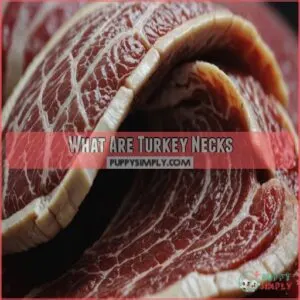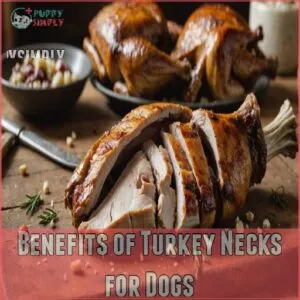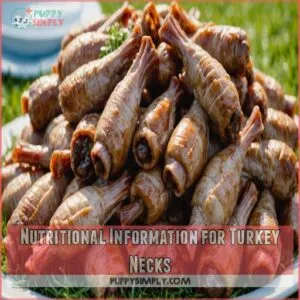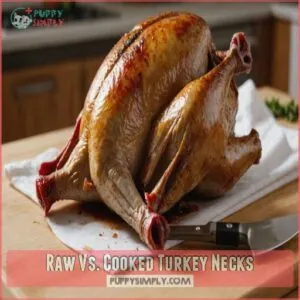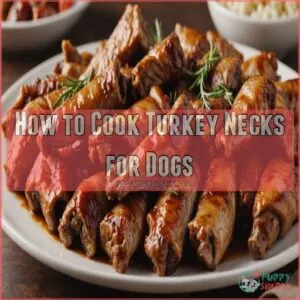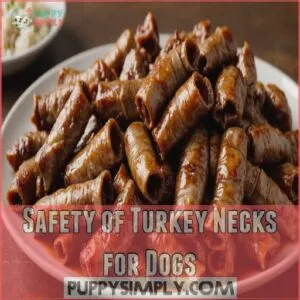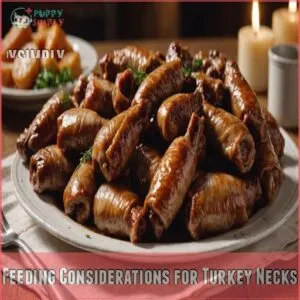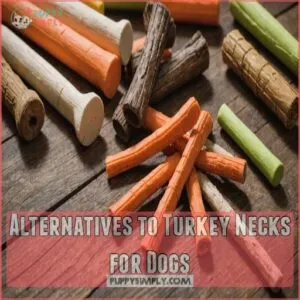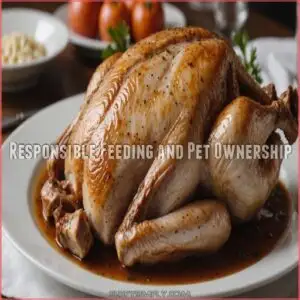This site is supported by our readers. We may earn a commission, at no cost to you, if you purchase through links.
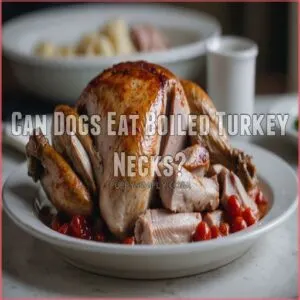
While dogs can technically eat them, it’s not the safest option. Boiling softens the bones, making them more likely to splinter and cause choking or internal injuries. Plus, cooked bones can lead to digestive issues faster than you can say "fetch!"
That said, turkey meat itself can be a healthy addition to your dog’s diet when prepared properly. It’s packed with protein and can give your furry friend a boost of energy.
But before you start cooking up a storm, there are some key things to keep in mind regarding feeding your dog poultry parts.
Table Of Contents
- Key Takeaways
- What Are Turkey Necks?
- Benefits of Turkey Necks for Dogs
- Nutritional Information for Turkey Necks
- Preparing Turkey Necks for Dogs
- Can Dogs Eat Boiled Turkey Necks?
- Safety of Turkey Necks for Dogs
- Feeding Considerations for Turkey Necks
- Alternatives to Turkey Necks for Dogs
- Adverse Reactions and When to Consult a Vet
- Responsible Feeding and Pet Ownership
- Frequently Asked Questions (FAQs)
- Can dogs eat raw turkey necks safely?
- Can dogs eat turkey necks on Thanksgiving?
- Can dogs eat raw or dehydrated turkey neck bones?
- What happens if a dog eats a turkey neck?
- Are turkey necks beneficial for dogs?
- Can dogs eat frozen turkey neck bones?
- Can I give my dog a boiled turkey neck?
- Can dogs eat boiled turkey bones?
- Can dogs eat cooked neck bones?
- Are boiled turkey necks healthy?
- How often can I give my dog turkey necks?
- Are turkey necks suitable for puppies and senior dogs?
- Can turkey necks replace dental chews for dogs?
- How do I store turkey necks for long-term use?
- Are there breed-specific considerations for feeding turkey necks?
- Conclusion
Key Takeaways
Here are 4 key takeaways about dogs eating boiled turkey necks:
- You shouldn’t feed your dog boiled turkey necks as they pose choking hazards and can splinter, potentially causing internal injuries.
- While turkey necks offer some nutritional benefits, safer alternatives like boneless cooked turkey or specially designed dental chews can provide similar advantages without the risks.
- If you’ve given your dog a turkey neck, watch for symptoms of choking, digestive issues, or allergic reactions, and consult your vet immediately if you notice any problems.
- As a responsible pet owner, you’ll want to prioritize your dog’s safety by choosing vet-approved treats and maintaining a balanced diet tailored to your pet’s specific needs and life stage.
What Are Turkey Necks?
You’re probably familiar with turkey as a holiday centerpiece, but have you ever considered the neck?
Turkey necks are the entire neck of the bird, complete with spine, trachea, and muscle, measuring up to a foot long and packed with protein and minerals.
Definition and Provenance
Ever wondered about those turkey necks your pup’s eyeing?
They’re the unsung heroes of the poultry industry, a by-product that’s found a new purpose in dog nutrition.
These neck pieces come from turkeys raised on farms, minus the head and crop.
While not fit for your dinner plate, they’ve become a go-to treat for dogs.
Just remember, ethical sourcing matters, so look for farms with high animal welfare standards.
Size and Composition
What’s the scoop on turkey necks? They’re not just a quirky dog treat; they’re a complex canine delicacy.
These bony bits can stretch up to 10-12 inches, packing quite a punch in the nutrition department.
Here’s what you’re dealing with:
- Spine and trachea for a crunchy challenge
- Muscle meat for protein power
- Connective tissue loaded with joint-loving compounds
- Cartilage for dental health benefits
- Fat pockets for flavor and energy
Remember, size matters in terms of food safety for your furry friend!
Animal Welfare Considerations
When you’re considering turkey necks for your pup, don’t forget about the birds behind the treat.
Ethical sourcing matters.
Look for turkey necks from free-range farms that prioritize animal welfare.
Here’s a quick guide to help you make informed choices:
| Farming Practice | Animal Welfare | Taste Quality |
|---|---|---|
| Free-range | High | Excellent |
| Cage-free | Moderate | Good |
| Conventional | Low | Average |
By choosing ethically sourced turkey necks, you’re not just treating your dog—you’re supporting humane farming practices too.
Benefits of Turkey Necks for Dogs
You’ll be surprised by the many benefits turkey necks offer your furry friend.
These treats can help clean your dog’s teeth, provide mental stimulation, and support joint health, making them a tasty and nutritious option for your canine companion.
Dental Health and Teeth Cleaning
Turkey necks aren’t just a tasty treat; they’re nature’s toothbrush for your furry friend.
As your dog gnaws on these chewy delights, they’re actually giving their teeth a good scrub.
The tough texture acts like dental floss, scraping away plaque and tartar buildup.
It’s like a spa day for your pup’s pearly whites!
Regular chewing can help keep their breath fresher and gums healthier, potentially saving you a trip to the doggy dentist.
Mental Enrichment and Stress Relief
Countless dog owners have discovered that boiled turkey necks can be a game-changer for their pup’s mental well-being.
These chewy treats offer more than just a tasty snack – they’re like a doggy stress ball and brain teaser rolled into one.
While raw turkey necks are a good source of protein, calcium, and phosphorus, here’s how they can help your furry friend:
- Relieve anxiety by providing a calming, repetitive activity
- Combat boredom, keeping your dog engaged for 20-30 minutes
- Stimulate problem-solving skills as they work to get every last morsel
Joint Health and Mobility
Many dog owners don’t realize that turkey necks are a natural joint supplement powerhouse.
They’re packed with glucosamine and chondroitin, which can help keep your pup’s joints healthy and mobile.
Here’s a quick breakdown of the benefits:
| Nutrient | Benefit | Source |
|---|---|---|
| Glucosamine | Reduces inflammation | Cartilage |
| Chondroitin | Improves flexibility | Connective tissue |
| Calcium | Strengthens bones | Neck bones |
By giving your furry friend turkey necks, you’re not just treating them – you’re investing in their long-term mobility and comfort.
Nutritional Information for Turkey Necks
You might be surprised by the nutritional punch packed into turkey necks for your canine companion.
These bony treats are rich in protein, essential minerals, and compounds that can support your dog’s overall health.
But it’s important to understand their caloric content and how they fit into a balanced diet.
Protein and Fat Content
Now, when it comes to turkey necks, it’s essential to consider the risks of cooked or boiled turkey necks, which can cause intestinal damage and pancreatitis due to their high fat content and potential to splinter into sharp shards, as seen in the dangers of can dogs eat turkey necks cooked. Let’s chew on the meaty details of turkey neck nutrition.
You’ll find these protein-rich treats pack quite a punch for your pup’s diet.
A 100-gram serving of turkey neck offers about 16 grams of protein and 17 grams of fat.
That’s a powerhouse combo for your furry friend’s muscles and energy needs.
- A juicy turkey neck dangling from your dog’s mouth
- Your pup’s eyes widening with excitement at mealtime
- Muscles rippling under a shiny coat after regular treats
- A contented canine sprawled out after a satisfying chew
- Your pooch’s tail wagging at warp speed for their favorite snack
Vitamins, Minerals, and Compounds
You’ve heard about the protein in turkey necks, but there’s more to the story.
These tasty treats are packed with vitamins and minerals that’ll make your pup’s tail wag.
Let’s break it down:
| Nutrient | Benefit |
|---|---|
| Calcium | Builds strong bones and teeth |
| Phosphorus | Supports kidney function |
| Zinc | Boosts immune system |
Talk about a nutritional powerhouse!
Your furry friend’s getting a whole lot of goodness in one chew.
It’s like a multivitamin disguised as a treat!
Caloric Value
Let’s talk turkey about calories!
While turkey necks pack a nutritious punch, they’re not exactly a lightweight snack.
A single boiled turkey neck can clock in at around 100-150 calories, depending on size.
That’s a hefty treat for your furry friend!
Here’s a quick rundown of why you should watch those turkey neck calories:
- Weight management
- Balanced diet maintenance
- Proper portion control
- Avoiding overfeeding
Remember, treats should make up no more than 10% of your dog’s daily calorie intake.
Keep it lean and mean!
Preparing Turkey Necks for Dogs
You’ll want to prepare turkey necks carefully before offering them to your furry friend.
Whether you choose to cook them or serve them raw, it’s important to remove excess fat and skin to make sure your dog gets a safe and healthy treat.
Raw Vs. Cooked Turkey Necks
While turkey necks pack a nutritional punch, you’re faced with a choice: raw or cooked.
Raw necks offer dental benefits and a natural texture dogs love, but they come with safety concerns like bacterial risks, and may harbor harmful bacteria like Salmonella, impacting your dog’s health.
Cooked necks, on the other hand, are safer but lose some nutritional value.
How to Cook Turkey Necks for Dogs
Cooking turkey necks for your furry friend isn’t rocket science, but it’s important to get it right.
Boil them in unseasoned water for about 20-30 minutes until they reach a safe internal temperature of 165°F (74°C).
Here’s a quick rundown:
- Boil thoroughly to kill harmful bacteria
- Cook until tender but not falling apart
- Let cool before serving to prevent burns
Remember, cooked bones can splinter, so always supervise your pup’s chew time.
Removing Excess Fat and Skin
Now that you’ve cooked the turkey necks, it’s time to trim the fat and remove the skin.
This step’s a game-changer for your pup’s health.
Grab a sharp knife and carefully slice off excess fat and peel away the skin.
You’ll be doing your dog’s waistline a favor, and it’ll make the treat easier to digest.
Plus, you’re reducing the risk of pancreatitis.
It’s like giving your furry friend a customized, doggy-approved meal!
Can Dogs Eat Boiled Turkey Necks?
You’ve heard that turkey necks are good for dogs, but you’re wondering if boiling them is safe.
While boiled turkey necks can offer some benefits, they come with risks that every pet owner should know about.
Safety Concerns and Risks
Your dog’s safety is at stake regarding boiled turkey necks. These seemingly innocent treats can be a minefield of risks.
Raw turkey necks, on the other hand, can be a healthy alternative, as they provide a natural source of glucosamine for joint health.
Let’s chew over the potential dangers:
- Choking hazards from large pieces
Benefits of Boiled Turkey Necks
While safety concerns exist, boiled turkey necks offer several benefits for your furry friend.
They’re a tasty protein source that supports muscle health and provides essential nutrients.
Let’s chew over the perks:
| Benefit | Description |
|---|---|
| Joint health | Rich in glucosamine and chondroitin |
| Dental care | Natural teeth cleaner, reduces plaque |
| Digestive health | Soft texture aids easy digestion |
| Skin & coat | Promotes healthy skin and shiny coat |
| Mental stimulation | Keeps dogs engaged and reduces boredom |
Remember, moderation is key when treating your pup to these nutritious nibbles!
Alternatives to Boiled Turkey Necks
Exploring alternatives to boiled turkey necks can open up a world of safe and tasty options for your pup.
You don’t have to put all your eggs in one basket when it comes to dog treats.
Consider these paw-some choices that’ll have your furry friend wagging with joy: Raw chicken necks, available in various forms like chicken neck treats online
Safety of Turkey Necks for Dogs
You might think turkey necks are a tasty treat for your pup, but they come with some risks you should know about.
From choking hazards to potential bacterial contamination, it’s important to weigh the pros and cons before tossing Fido this controversial snack.
Choking Hazards and Obstruction Risks
Let’s talk turkey about those boiled necks and your pup’s safety.
The size of the turkey neck matters – it should match your dog’s size and chew strength.
Small dogs might bite off more than they can chew, leading to choking or intestinal blockage.
Always supervise your furry friend during treat time, and consider safe alternatives if you’re worried.
Remember, it’s better to be safe than sorry in regard to your dog’s well-being.
Bacterial Contamination and Food Poisoning
Beyond choking hazards, bacterial contamination poses a serious threat when feeding turkey necks to your furry friend.
Raw poultry can harbor nasty bugs like Salmonella, putting your pup at risk of food poisoning.
For safe alternatives, consider consulting resources on boiled turkey safe dogs.
Don’t let your dog’s treat turn into a trick!
Here’s what you need
Allergic Reactions and Sensitivities
Just like humans, some dogs can be allergic to turkey.
Watch for signs like itching, hives, or tummy troubles after your pup chows down on turkey necks.
If you suspect a sensitivity, it’s best to play detective and identify the culprit.
Consider allergy testing or an elimination diet to pinpoint the trigger.
Remember, every dog’s different, so what’s a tasty treat for one might spell trouble for another.
Feeding Considerations for Turkey Necks
You’ll want to consider the dental benefits, including how raw turkey necks can help remove plaque and tartar build-up from a dog’s teeth by providing calcium, phosphorus, B vitamins, iron, copper, selenium, and zinc, all of which contribute to healthy teeth through raw turkey necks for dogs. Tailor your turkey neck feeding approach based on your dog’s size.
Keep a close eye on your furry friend while they enjoy this treat, and remember to adjust portions to complement their overall nutrition plan.
Suitable for Medium to Large Dogs
In terms of feeding turkey necks, size matters.
Medium to large dogs, with their powerful jaws and strong digestive systems, are better suited for this chewy treat.
Smaller pups might struggle and risk choking.
Consider your dog’s size and chew strength before offering turkey necks.
A Great Dane might breeze through one, while a Chihuahua could end up biting off more than they can chew – literally!
Supervising Dogs During Feeding
Now that you’ve chosen the right size turkey neck, let’s talk about keeping an eye on your pup while they chow down.
Supervising your dog during feeding is like being a lifeguard at a pool party – you’re there to make sure everyone has a good time safely.
You can even find turkey neck treats online for a convenient option.
Here are three key reasons to stay vigilant:
- Prevent choking hazards
- Monitor for allergic reactions
- Ensure proper chewing technique
Remember, it’s better to be safe than sorry regarding your furry friend’s mealtime adventures.
Adjusting Feeding Amount Based on Diet and Activity
Once you’ve got a handle on safe feeding, it’s time to fine-tune the amount.
Your pup’s age, weight, breed, and exercise level all play a part in deciding how much turkey neck to dish out.
To get a better understanding of how much food your dog might need, check out a helpful feeding chart
Active dogs might need more, while couch potatoes should go easy.
Remember, treats like boiled turkey necks should make up no more than 10% of your dog’s daily calories.
Keep it balanced!
Alternatives to Turkey Necks for Dogs
If you’re looking for safer options than turkey necks, you’re in luck.
From boneless cooked turkey to dental chews, there are plenty of tasty and healthy alternatives that’ll keep your pup’s tail wagging.
Boneless Cooked Turkey
Looking for a safer alternative to turkey necks? Boneless cooked turkey is your go-to option.
It’s a lean protein source that’s easy to digest and perfect for picky eaters.
Just remember to remove the skin and any seasoning.
You can dice it up as a tasty topper or use it in homemade dog treats.
It’s a versatile, nutritious choice that’ll have your pup’s tail wagging in no time!
Other Healthy Treat Options
While turkey necks can be a tasty treat, there’s a whole world of healthy alternatives for your furry friend.
You can whip up a fruit salad with dog-safe options like apple slices or blueberries.
Veggie lovers might enjoy carrot sticks or cucumber rounds.
For a protein punch, try plain yogurt or homemade chicken jerky.
These treats aren’t just delicious; they’re packed with nutrients and can help keep your pup’s pearly whites clean.
Dental Chews and Toys
Frequently, dental chews and toys offer a safer alternative to turkey necks for your pup’s dental health.
These specially designed treats scrape away plaque and tartar while satisfying your dog’s natural urge to chew.
From rubbery Kong toys to enzymatic chews, you’ve got options.
Just remember, no chew is indestructible.
Always supervise your furry friend and choose size-appropriate toys to avoid any choking hazards.
Adverse Reactions and When to Consult a Vet
While boiled turkey necks can be a tasty treat for dogs, they’re not without risks.
If you notice any unusual symptoms after feeding your pup turkey necks, like vomiting or lethargy, it’s time to ring up your vet for some expert advice.
Symptoms of Food Poisoning and Allergic Reactions
Keep a watchful eye on your furry friend after they’ve had turkey necks.
If your dog’s tummy starts doing the cha-cha with vomiting or diarrhea, it might be food poisoning.
Bacterial baddies like salmonella could be the culprits.
On the flip side, if your pup’s scratching like they’re auditioning for a flea circus or breaking out in hives, you might be dealing with dog allergies.
Lethargy’s another red flag to watch for.
Emergency Situations and Treatment
If your dog ingests raw turkey necks, they may be exposed to bacterial contamination risks like Salmonella from raw poultry. In a pinch, you need to act fast if your dog shows signs of distress after eating turkey necks.
Watch for choking, vomiting, or diarrhea.
If your pup’s having trouble breathing or seems in pain, don’t wait – head to the vet ASAP.
For milder digestive upset, offer water and withhold food temporarily.
Remember, it’s better to be safe than sorry regarding potential intestinal blockages or food poisoning.
Preventative Measures and Precautions
To avoid a turkey neck fiasco, you’ll want to play it safe.
Always supervise your pup while they’re chowing down on these treats.
Watch out for choking hazards and bone splintering, especially with cooked turkey necks.
Raw ones? They’re a bacterial playground, so handle with care.
If you notice any allergic reactions or odd behavior, don’t hesitate to ring up your vet.
Better safe than sorry regarding your furry friend’s health!
Responsible Feeding and Pet Ownership
You’re the guardian of your furry friend’s health, so it’s essential to make informed choices about their diet.
As a responsible pet owner, you’ll want to balance nutritional needs with safety concerns when considering treats like boiled turkey necks.
Providing a Balanced Diet
While you’re watching for signs of trouble, let’s talk about fueling your furry friend right.
A balanced diet is the backbone of your dog’s health, and incorporating alternatives like poultry protein sources can help keep things interesting.
Mix it up with high-quality dog food brands and homemade recipes that cover all the nutritional bases.
Count those calories to keep your pup in tip-top shape.
Remember, turkey necks
Choosing Safe and Healthy Treats
Choosing safe and healthy treats for your furry friend, you’ve got options galore!
Stick to natural ingredients and watch out for potential allergies.
Homemade treats let you control what goes in, while reputable commercial brands offer convenience.
Whether you’re considering boiled turkey necks or other goodies, prioritize dental health and food safety.
Remember, treats should complement a balanced diet, not replace it.
Your pup’s tail will wag with joy!
Ensuring Proper Supervision and Care
Keep your eyes peeled when giving your pup boiled turkey necks.
It’s essential to supervise your dog, as these treats can pose choking risks.
Don’t let your furry friend gobble them up too quickly.
Stick to safe feeding practices by offering treats in moderation and watching for any signs of distress.
Being a responsible pet owner means balancing treats with a healthy diet and always putting your dog’s safety first.
Frequently Asked Questions (FAQs)
Can dogs eat raw turkey necks safely?
Raw turkey necks, which provide high-quality protein and joint health benefits, pose risks for dogs.
They can harbor harmful bacteria like salmonella, causing food poisoning.
There’s also a choking hazard and potential for intestinal obstruction.
It’s safer to opt for cooked, boneless turkey as a treat instead.
Can dogs eat turkey necks on Thanksgiving?
Hold your horses before tossing Fido a turkey neck on Thanksgiving!
It’s best to avoid this tempting treat.
Cooked bones can splinter, causing choking or internal injuries.
Stick to dog-safe alternatives to keep your pup happy and healthy.
Can dogs eat raw or dehydrated turkey neck bones?
While dogs can eat raw or dehydrated turkey neck bones as a nutritious weekly treat packed with essential nutrients like protein, calcium, and glucosamine according to Raw Turkey Neck Benefits, it’s not recommended.
These treats pose choking and bacterial risks.
Instead, opt for safer alternatives like cooked, boneless turkey.
Always prioritize your pup’s safety when choosing treats.
What happens if a dog eats a turkey neck?
If your dog eats a turkey neck, they might face risks like choking, digestive issues, or bacterial infections.
Cooked bones can splinter, causing internal injuries.
Monitor them closely for any unusual behavior and contact your vet if you’re concerned.
Are turkey necks beneficial for dogs?
Turkey necks are a canine superfood!
They’re packed with protein, clean teeth like a doggy dentist, and provide mental stimulation.
But don’t go wild – moderation’s key.
Always cook ’em thoroughly and supervise your pup’s chew time for safety.
Can dogs eat frozen turkey neck bones?
Frozen turkey neck bones aren’t recommended for dogs.
They’re too hard and can damage teeth or cause choking.
Instead, offer safer alternatives like specially designed dog chews.
Always prioritize your pup’s safety when choosing treats.
Can I give my dog a boiled turkey neck?
While boiled turkey necks can be a protein-rich treat, they’re not recommended for dogs.
They pose choking hazards and might contain harmful bacteria.
Instead, opt for boneless cooked turkey as a safer, nutritious alternative for your furry friend.
Can dogs eat boiled turkey bones?
Boiled turkey bones aren’t safe for your pup.
They can splinter, causing choking or internal injuries.
Stick to dog-specific treats instead.
If you’re set on turkey, offer small bits of lean, cooked meat without bones.
Safety first, tail-waggers!
Can dogs eat cooked neck bones?
You shouldn’t feed your dog cooked neck bones.
They can splinter easily, posing a serious choking hazard or causing internal injuries.
It’s best to stick with safer alternatives like specially designed dog chews or boneless, cooked meat treats.
Are boiled turkey necks healthy?
Ironically, what’s good for the turkey isn’t always golden for your pooch.
Boiled turkey necks pack a protein punch but come with risks.
They’re not a health hero – think choking hazards and bacterial baddies.
Safer options exist for Fido’s feast.
How often can I give my dog turkey necks?
Moderation is key when treating your pup to turkey necks.
Offer them once or twice a week as part of a balanced diet.
Always monitor your dog while they’re enjoying this chewy treat to make sure they consume it safely.
Are turkey necks suitable for puppies and senior dogs?
Turkey necks aren’t ideal for puppies or seniors.
Puppies need softer foods for developing teeth.
Seniors may struggle with tough textures.
Consider age-appropriate alternatives that provide similar nutrients without the choking risk or digestive challenges.
Can turkey necks replace dental chews for dogs?
While turkey necks can help clean your dog’s teeth, they shouldn’t fully replace dental chews.
They’re a great occasional treat, but dental chews are specifically designed for oral health.
Mix it up for the best doggy dental care!
How do I store turkey necks for long-term use?
Freeze-frame your turkey necks’ freshness!
Wrap ’em tightly in freezer bags, squeeze out air, and label with the date.
They’ll keep for up to 6 months in the freezer.
For shorter storage, refrigerate in airtight containers for 2-3 days.
Are there breed-specific considerations for feeding turkey necks?
Size matters regarding feeding turkey necks.
Larger breeds can handle whole necks, while smaller dogs need them cut up.
When considering treats, be aware that some, like pork bones dangers, can pose serious health risks. Always supervise and consider your dog’s chewing habits and dental health before offering this treat.
Conclusion
Ironically, the question "can dogs eat boiled turkey necks?" has a simple answer: they shouldn’t.
While these treats might seem tempting, the risks outweigh the benefits.
Instead, focus on safer alternatives that still provide the nutrients and dental benefits your pup craves.
Remember, your dog’s health is in your hands.
By making informed choices about their diet, you’re ensuring a happy, healthy life for your furry friend.
So, skip the boiled turkey necks and opt for vet-approved treats that’ll keep your dog’s tail wagging for years to come.
- https://britishpoultry.org.uk/identity-cms/wp-content/uploads/2018/05/2016-ADAS-EU-US-comparison.pdf
- https://www.ncbi.nlm.nih.gov/pmc/articles/PMC6849757/
- https://www.fda.gov/animal-veterinary/animal-health-literacy/get-facts-raw-pet-food-diets-can-be-dangerous-you-and-your-pet
- https://www.sciencedirect.com/science/article/pii/S0168159121001593
- https://www.cdc.gov/healthypets/publications/pet-food-safety.html

